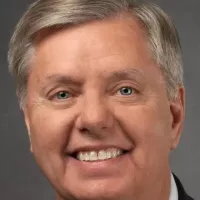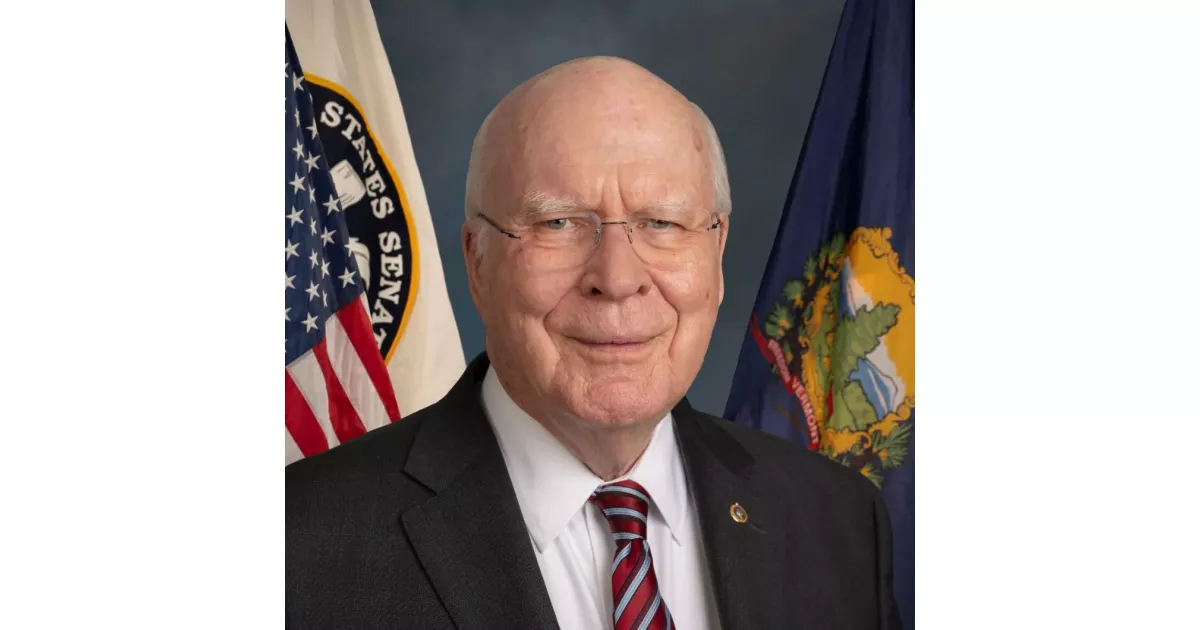Patrick Leahy is an American politician and attorney who served as a U.S. Senator for Vermont from 1975 to 2023. As a member of the Democratic Party, he held the position of president pro tempore of the Senate twice, from 2012 to 2015 and again from 2021 to 2023.
March 31, 1940: Patrick Leahy Born
On March 31, 1940, Patrick Joseph Leahy was born. He later became a U.S. Senator for Vermont.
1957: Graduation from St. Michael's High School
In 1957, Patrick Leahy graduated from St. Michael's High School in Montpelier.
1961: Graduation from Saint Michael's College
In 1961, Patrick Leahy graduated from Saint Michael's College with a Bachelor of Arts degree in government.
1962: Leahy Marries Marcelle Pomerleau
In 1962, Patrick Leahy married Marcelle Pomerleau.
1964: Graduation from Georgetown University Law Center
In 1964, Patrick Leahy received his Juris Doctor from the Georgetown University Law Center.
January 1965: Appointed Assistant Legislative Draftsman
In January 1965, Patrick Leahy was appointed as an assistant to Lewis E. Springer Jr., the legislative draftsman for the Vermont General Assembly.
May 1966: Appointed State's Attorney
In May 1966, Patrick Leahy was appointed State's Attorney of Chittenden County.
1970: Re-elected as State's Attorney
In 1970, Patrick Leahy was re-elected as State's Attorney of Chittenden County.
1971: Vice President of National Association of District Attorneys
In 1971, Patrick Leahy served as vice president of the National Association of District Attorneys.
1974: Elected to the United States Senate
In 1974, Patrick Leahy was elected to the United States Senate, becoming the youngest U.S. senator in Vermont history and the first Democrat to represent Vermont in the chamber.
1974: Named Outstanding Prosecutor
In 1974, Patrick Leahy was named one of the country's three outstanding prosecutors by the National Association of District Attorneys.
1975: Elected to the United States Senate
In 1975, Patrick Leahy began his service as a United States Senator for Vermont.
1980: Re-elected to the Senate
In 1980, Patrick Leahy was re-elected to the Senate, defeating Stewart Ledbetter.
May 1981: Request to reject John Crowell Jr.'s nomination
In May 1981, Patrick Leahy and Senator Ted Kennedy requested that the Senate reject John Crowell Jr.'s nomination as Assistant Agriculture Secretary, citing concerns about Crowell's involvement in anti-competitive practices.
October 1981: Amendment to increase Energy Department's enforcement budget
In October 1981, Patrick Leahy introduced an amendment to increase the Energy Department's enforcement budget by $13 million, arguing against the Reagan administration's cuts. The amendment was defeated on October 28, 1981.
December 2, 1981: Vote for MX Missiles Amendment
On December 2, 1981, Patrick Leahy voted for an amendment to Reagan's MX missiles proposal to divert funds and research alternative missile basing methods.
March 11, 1982: Leahy Votes Against Measure Seeking to Reverse Roe v. Wade
On March 11, 1982, Leahy voted against a measure sponsored by Orrin Hatch that sought to reverse Roe v. Wade and allow Congress and individual states to adopt laws banning abortions.
March 1982: Named to Senate Select Committee
In March 1982, Patrick Leahy was named to the Senate Select Committee to Study Law Enforcement Undercover Activities of the Department of Justice.
December 23, 1982: Vote for gasoline tax increase
On December 23, 1982, Patrick Leahy voted for a five-cent per gallon increase on gasoline taxes to finance highway repairs and mass transit.
October 19, 1983: Vote for Martin Luther King Jr. Day
On October 19, 1983, Patrick Leahy voted for a bill establishing Martin Luther King Jr. Day.
March 1984: Vote against school prayer amendment
In March 1984, Patrick Leahy voted against a proposed constitutional amendment authorizing silent prayer in public schools, and against Reagan's proposal for school prayer.
1986: Re-elected to the Senate
In 1986, Patrick Leahy was re-elected to the Senate, defeating Richard Snelling.
1986: Electronic Communications Privacy Act of 1986
Leahy is a lead sponsor of the Senate version of the Email Privacy Act, which would reform the Electronic Communications Privacy Act of 1986 and enhance privacy protections for email.
January 3, 1987: Appointed Chair of Senate Agriculture Committee
On January 3, 1987, Patrick Leahy was appointed chair of the Senate Agriculture Committee.
1987: Leahy Chairs Agriculture, Nutrition and Forestry Committee
In 1987, Leahy became the chair of the Agriculture, Nutrition and Forestry Committee.
1987: Filed lawsuit against Agriculture Secretary Richard Edmund Lyng
In 1987, Patrick Leahy filed lawsuit against Agriculture Secretary Richard Edmund Lyng.
1988: Judiciary Committee Comments
In 1988, as a member of the Senate Judiciary Committee, Leahy stated Senate Democrats would refuse hearings for any Supreme Court nominee until after the 1988 presidential election if Reagan could not produce an acceptable nominee.
May 1989: Urged withdrawal of Agriculture Department proposals
In May 1989, Patrick Leahy urged the Agriculture Department to withdraw proposals regarding the reduction of federal inspections.
May 1990: Introduced Consumer Seafood Safety Act
In May 1990, Patrick Leahy and Representative Dan Glickman introduced the Consumer Seafood Safety Act, a bill that would have strengthened fish inspections.
February 1992: Proposed Loan Guarantee Plan
In February 1992, after a meeting between Secretary of State James Baker and Zalman Shoval failed, Patrick Leahy, after being informed by Baker, announced that he would introduce his own plan for the loan guarantee package for Israel if the U.S. and Israel could not reach an agreement in the following weeks.
1992: Introduced bill to prohibit export of land mines
In 1992, Patrick Leahy introduced a bill to prohibit the export of land mines, the first law of its kind.
1992: Re-elected to the Senate
In 1992, Patrick Leahy was re-elected to the Senate, defeating Jim Douglas.
1992: Leahy wrote the foreword to The Dark Knight Archives, Volume 1
In 1992, Patrick Leahy, a comic book fan, wrote the foreword to "The Dark Knight Archives, Volume 1", which is a collection of the first four Batman comic books.
November 20, 1993: Voted for North American Free Trade Agreement
On November 20, 1993, Patrick Leahy voted for the North American Free Trade Agreement (NAFTA).
March 1994: Pledged to Preserve Funding for TEFAP
In March 1994, during a news conference, Patrick Leahy pledged that he would preserve funding for The Emergency Food Assistance Program (TEFAP).
August 1994: Advocated for Healthier School Lunches
In August 1994, Patrick Leahy attended a news conference with Public Voice, advocating for the federal government to increase the healthiness of school lunches.
December 1994: Downsizing of Agriculture Department
In December 1994, Patrick Leahy cosponsored legislation that led to the downsizing of the Agriculture Department, which announced the closing of 1,274 field offices around the U.S. and an estimated savings of over $3 billion over five years.
1994: Leahy backstage at Grateful Dead show
In 1994, Patrick Leahy, a self-proclaimed Deadhead, was pictured backstage at a Grateful Dead performance.
1995: Leahy Votes Against Partial-Birth Abortion Ban Act
In 1995, Leahy voted against the Partial-Birth Abortion Ban Act, demonstrating his support for abortion rights.
1995: End of Leahy's Tenure as Chair of Agriculture, Nutrition and Forestry Committee
In 1995, Leahy's tenure as the chair of the Agriculture, Nutrition and Forestry Committee came to an end.
1995: Leahy cameos in Batman Forever and Batman: The Animated Series
In 1995, Patrick Leahy made an uncredited cameo in the film "Batman Forever" and voiced a territorial governor in the "Batman: The Animated Series" episode "Showdown".
1996: Leahy wrote the preface essay for Batman: Death of Innocents
In 1996, Patrick Leahy wrote the preface essay for "Batman: Death of Innocents", which is a graphic novel about the horrors of landmines.
1997: Leahy Votes For Partial-Birth Abortion Ban Act
Between 1997 and 2003, Leahy voted for the Partial-Birth Abortion Ban Act.
1997: Leahy appeared as himself in the film Batman & Robin
In 1997, Patrick Leahy appeared as himself in the film "Batman & Robin".
1998: Fred Tuttle Endorses Leahy
In 1998, Republican candidate Fred Tuttle, a retired farmer and actor, endorsed Patrick Leahy in the United States Senate election in Vermont. Tuttle, who won the Republican nomination after running a campaign to promote the movie 'Man with a Plan', recommended voters support Leahy. This gesture led to joint appearances and a warm relationship, with Leahy calling Tuttle the "distilled essence of Vermonthood."
October 1999: Voted for Comprehensive Test Ban Treaty
In October 1999, Patrick Leahy voted for the Comprehensive Test Ban Treaty, designed to ban underground nuclear testing.
2000: Leahy Requests Delay in Implementing Section 304 in H.R. 4392
In 2000, Leahy cosigned a letter requesting a delay in implementing Section 304 in H.R. 4392, the Intelligence Authorization Act for Fiscal Year 2001, citing concerns about conflicts with First Amendment rights and Whistleblower Protection Acts.
2001: Leahy Chairs Judiciary Committee
In 2001, Leahy became the chair of the Judiciary Committee.
2001: Leahy Targeted in Anthrax Attacks
In 2001, Senator Leahy was one of two senators targeted in the anthrax attacks. The anthrax letter addressed to him was intercepted before reaching his office.
September 13, 2002: Leahy Calls for West Nile Virus Investigation
On September 13, 2002, Senator Leahy suggested in a radio interview that an investigation should be launched to determine whether the West Nile virus was a biological terrorism effort.
2003: Leahy Votes For Partial-Birth Abortion Ban Act
Between 1997 and 2003, Leahy voted for the Partial-Birth Abortion Ban Act.
2003: Leahy Opposes Invasion of Iraq
In 2003, Leahy opposed the invasion of Iraq. He later wrote in his memoir that he found files that contradicted public statements made by Dick Cheney about Iraq.
2003: End of Leahy's Tenure as Chair of Judiciary Committee
In 2003, Leahy's tenure as the chair of the Judiciary Committee came to an end.
March 2004: Leahy Introduces the Pirate Act
In March 2004, Leahy and Senator Orrin Hatch introduced the Pirate Act, which was backed by the Recording Industry Association of America and aimed at combating copyright infringement.
June 22, 2004: Cheney and Leahy Exchange Words
On June 22, 2004, after a U.S. Senate class photo, Vice President Dick Cheney rebuked Senator Leahy for his criticism of Halliburton's activities in Iraq, reportedly telling him, "Go fuck yourself."
July 2004: Leahy Introduces the INDUCE Act
In July 2004, Leahy and Hatch introduced the INDUCE Act, also aimed at combating copyright infringement.
November 2, 2004: Leahy Reelected to the Senate
On November 2, 2004, Leahy was reelected to the Senate, easily defeating his opponent, businessman Jack McMullen, with 70.6 percent of the vote.
2004: The Honors College at UVM was founded
In 2004, The Honors College was founded at the University of Vermont.
September 21, 2005: Leahy Supports John Roberts for Chief Justice
On September 21, 2005, Leahy announced his support for John Roberts to become Chief Justice of the United States Supreme Court.
January 19, 2006: Leahy Opposes Samuel Alito's Nomination
On January 19, 2006, Leahy announced that he would vote against Judge Samuel Alito's nomination to be a justice of the Supreme Court.
March 2, 2006: Leahy Votes Against USA PATRIOT Improvement and Reauthorization Act
On March 2, 2006, Leahy was one of ten senators to vote against the USA PATRIOT Improvement and Reauthorization Act, citing concerns about the appointment process for interim United States attorneys.
December 2006: Leahy on White House Power Plays after 9/11
In December 2006, Leahy spoke at Georgetown University, stating that after the September 11 attacks, the White House accelerated its power plays, undermined other government branches, and illegally wiretapped Americans without warrants.
January 18, 2007: Leahy Cross-Examines Attorney General Alberto Gonzales
On January 18, 2007, Leahy received widespread coverage for his cross-examination of Attorney General Alberto Gonzales regarding the Maher Arar affair and extraordinary rendition of Arar to Syria.
March 2007: Houses Overturn Interim Appointment Provision
In March 2007, both houses voted to overturn the interim appointment provision that allowed the Attorney General of the United States to make interim appointments without term limit or Senatorial confirmation.
July 1, 2007: Leahy Recommends Revision to Federal Intelligence Surveillance Act
In a July 1, 2007, interview, Leahy stated that he was not against lawful eavesdropping and suggested revising the Federal Intelligence Surveillance Act to facilitate investigations of potential terrorists, also mentioning a subpoena for the White House regarding wiretapping practices.
2007: Leahy Chairs Judiciary Committee Again
In 2007, Leahy once again became the chair of the Judiciary Committee.
2008: Leahy Endorses Barack Obama
In 2008, Leahy endorsed Barack Obama, the Democratic junior senator from Illinois, in the presidential election, and recorded a radio advertisement for Obama's campaign to be aired in Vermont.
2008: Leahy appeared in The Dark Knight
In 2008, Patrick Leahy appeared in "The Dark Knight" as a fundraiser guest who confronts the Joker.
2008: Leahy criticizes alleged human rights violations during Operation Cast Lead
In 2008, Senator Leahy voiced his criticism of alleged human rights violations in the region, especially following Operation Cast Lead.
May 2009: Obama Nominates Sotomayor to Supreme Court
In May 2009, President Obama nominated Sonia Sotomayor to the Supreme Court. Sotomayor faced criticism for comments about a "wise Latina woman".
September 20, 2010: Leahy Introduces Combating Online Infringement and Counterfeits Act
On September 20, 2010, Leahy introduced the Combating Online Infringement and Counterfeits Act (Senate Bill S. 3804), which would allow courts to issue restraining orders against Internet domain names infringing on copyright.
December 2010: Leahy votes for New START treaty
In December 2010, Patrick Leahy voted in favor of ratifying the New START treaty. This nuclear arms reduction treaty between the United States and the Russian Federation aimed to limit both countries to no more than 1,550 strategic warheads and 700 launchers deployed over the subsequent seven years. The treaty also facilitated the continuation of on-site inspections that had been suspended when START I concluded the previous year.
May 2011: Leahy Introduces Protect IP Act (PIPA)
In May 2011, Leahy introduced the Protect IP Act (PIPA) to the Senate, aimed at combating copyright piracy and counterfeit goods trafficking by foreign websites. Critics raised concerns about its potential impact on free expression and internet infrastructure.
2011: Leahy Voted Against Limiting EPA's Ability to Regulate Greenhouse Gas Emissions
In 2011, Leahy voted against limiting EPA's ability to regulate greenhouse gas emissions, demonstrating his support for environmental policy.
2011: Leahy promoted bill to cut military aid to IDF units
In 2011, Senator Leahy initially promoted a bill to cut military aid to three elite IDF units after reports of human rights violations during the Gaza flotilla raid and in the West Bank and Gaza Strip.
May 2012: Leahy advocates for upholding Affordable Care Act
In May 2012, during a speech on the Senate floor, Senator Leahy urged Chief Justice John Roberts to uphold the constitutionality of the Affordable Care Act. He argued that it would be extraordinary for the Supreme Court not to defer to Congress on a matter that clearly affects interstate commerce.
December 17, 2012: Leahy Becomes President Pro Tempore
On December 17, 2012, following the death of Daniel Inouye, Leahy became the most senior senator in the majority party and was elected President Pro Tempore by unanimous consent.
2012: Leahy appeared in The Dark Knight Rises
In 2012, Patrick Leahy appeared in "The Dark Knight Rises" as a Wayne Enterprises board member who defended the legacy of the Wayne family.
2012: President Pro Tempore of the Senate
In 2012, Patrick Leahy assumed the role of president pro tempore of the United States Senate.
2012: Leahys Celebrate 50th Wedding Anniversary
In 2012, Patrick and Marcelle Leahy celebrated their 50th wedding anniversary.
February 2013: Leahy Signs Letter on Hate Crimes
In February 2013, Leahy was among 24 senators who signed a letter asserting the need for federal tracking of hate crimes against Sikh, Hindu, and Arab Americans.
June 2013: Leahy Files Amendments on Immigration Reform
In June 2013, Leahy filed three amendments to an immigration reform package, including one proposing recognition of same-sex marriages when one spouse is an American citizen, aimed at ending discrimination in the American immigration system.
June 2013: Leahy Introduces Bill to Tighten Guidelines Related to FISA Warrants
In June 2013, following the disclosure of PRISM and other covert surveillance activities by the National Security Agency, Leahy introduced a bill that would tighten guidelines related to the acquisition of FISA warrants for domestic surveillance and shorten the current FISA authorization by two years.
2013: Leahy Sponsors Most Bipartisan Bills
According to GovTrack, in 2013, Leahy was the senator who sponsored the most bipartisan bills. Sixty-one percent of the bills he sponsored had both Democratic and Republican co-sponsors.
2013: Leahy Voted Against Resolution Making it Harder to Put a Price on Carbon
In 2013, Leahy voted against a concurrent resolution creating a point of order which would make it harder for Congress to put a price on carbon, continuing his support for environmental policy.
2013: Leahy receives Heinz Award
In 2013, Patrick Leahy was awarded the annual U.S. Senator John Heinz Award for Greatest Public Service by an Elected or Appointed Official from the Jefferson Awards for Public Service.
2014: Leahy wins Silver and Gold Mouse Awards
In 2014, the Congressional Management Foundation awarded Patrick Leahy a "Silver Mouse Award" for his website, and a "Gold Mouse Award" for his engagement on social media.
January 3, 2015: Hatch Succeeds Leahy as President Pro Tempore
On January 3, 2015, Orrin Hatch succeeded Leahy as President Pro Tempore, and Leahy became President Pro Tempore Emeritus.
January 2015: Leahy Leads Congressional Delegation to Cuba
In January 2015, Leahy led a congressional delegation to Cuba, the first visit by American officials since President Obama announced normalized relations between the US and Cuba the previous month.
February 2015: Leahy Revives the Justice Safety Valve Act
In February 2015, Leahy and Republican Rand Paul revived the Justice Safety Valve Act, legislation granting federal judges authority to bestow sentences lower than the mandatory punishment in certain cases.
July 2015: Leahy Issues Statement on Iran Nuclear Deal
In July 2015, after the Joint Comprehensive Plan of Action was unveiled, Leahy issued a statement saying the international agreement on Iran's nuclear program was preferable to war and expressed disappointment at congressional opposition.
2015: Leahy Voted in Support of Obama's Clean Power Plan
In 2015, Leahy voted in support of Obama's Clean Power Plan, further solidifying his commitment to environmental policy.
2015: End of Leahy's Tenure as Chair of Judiciary Committee
In 2015, Leahy's tenure as the chair of the Judiciary Committee came to an end.
2015: End of first term as President Pro Tempore
In 2015, Patrick Leahy's first term as president pro tempore of the United States Senate concluded.
February 2016: Leahy Introduces the "Restoring Statutory Rights Act"
In February 2016, Leahy introduced the "Restoring Statutory Rights Act", to prevent companies from imposing forced arbitration in cases covered by consumer protection laws, as well as employment discrimination and other civil rights matters.
February 2016: Leahy requests investigation into human rights violations by Egyptian and Israeli forces
In February 2016, Senator Leahy joined ten House of Representatives members in requesting the State Department to investigate suspected human rights violations by Egyptian and Israeli security forces. They cited claims of extrajudicial killings, which could trigger the Leahy Law and potentially suspend American military aid.
October 2016: Leahy requests halt to Dakota Access Pipeline
In October 2016, Senator Leahy and four other senators signed a letter to President Obama, requesting that the administration halt work on the Dakota Access Pipeline. They emphasized the need for transparency, tribal consultation, and environmental review in the permitting process.
January 2017: Leahy Questions Jeff Sessions on Sexual Assault
In January 2017, during a hearing, Leahy questioned Jeff Sessions, President-elect Donald Trump's nominee for attorney general, about sexual assault and the ability to investigate elected officials accused of such acts, referencing comments made by Trump.
February 2017: Leahy signs letter regarding Trump campaign and Russia
In February 2017, Patrick Leahy was among 11 senators who signed a letter to United States Attorney General Jeff Sessions. The letter expressed concern about allegations of collusion between the Trump campaign, transition team, and Administration with the Russian government. The senators requested an independent Special Counsel to investigate potential collusion by General Flynn and other Trump officials.
March 2017: Leahy warns of Medicaid cuts' impact on substance abuse treatment
In March 2017, Senator Leahy and 20 other senators signed a letter to Senate Majority Leader Mitch McConnell, warning that the American Health Care Act could negatively impact substance abuse treatment due to inadequate funding. They highlighted that Medicaid finances one-third of treatment for opioid and other substance use disorders and that cuts could lead to a "death spiral" for those affected.
March 2017: Leahy criticizes American Health Care Act
In March 2017, after House Republicans withdrew the American Health Care Act, Senator Leahy issued a statement highlighting the achievements of the Affordable Care Act. He criticized Republicans for attempting to repeal it with a bill he characterized as a tax cut for the wealthiest Americans.
April 2017: Leahy Cosponsors Bill to Restore FCC Rule
In April 2017, Leahy was one of 11 senators to cosponsor a bill aimed at restoring a FCC rule that required internet service providers to obtain customer permission before selling their data to advertisers.
April 2017: Leahy sponsors legislation to reinstate internet privacy regulations
In April 2017, after President Trump signed a law undoing a Federal Communications Commission (FCC) rule requiring internet service providers to obtain customer permission to sell their data, Senator Leahy co-sponsored legislation to reverse the repeal and reinstate the regulations.
June 1, 2017: Leahy and Franken Release Statement on Sessions and Russia
On June 1, 2017, Leahy and Senator Al Franken released a joint statement disclosing their prior request of James Comey to investigate contacts between Attorney General Sessions and Russian officials, raising questions of perjury in Senate testimony.
June 2017: Leahy criticizes Trump's withdrawal from Paris Agreement
In June 2017, Senator Leahy responded to President Trump's announcement that the U.S. would withdraw from the Paris Agreement by calling it a "great leap backward." He stated his intention to protect Vermont's efforts in combating climate risk and to support clean energy innovation.
September 2017: Leahy Votes Against National Defense Authorization Act
In September 2017, Leahy was one of eight senators to vote against the National Defense Authorization Act (NDAA), a defense policy bill including significant defense spending and war funds.
September 2017: Leahy co-sponsors Medicare for All Act
In September 2017, Senator Leahy co-sponsored the Medicare for All Act, which was introduced by Senator Bernie Sanders. The act aimed to establish a single-payer healthcare system in the United States.
October 2017: Leahy Cosponsors Bill Aimed at Easing Sentences for Some Nonviolent Offenders
In October 2017, Leahy cosponsored a bill aimed at easing sentences for some nonviolent offenders, such as for drug crimes, while beefing up other tough-on-crime laws.
November 2017: Leahy Urges Israel to Halt Demolitions of Palestinian Villages
In November 2017, Leahy was among ten Democratic senators who signed a letter urging Israeli Prime Minister Benjamin Netanyahu to halt planned demolitions of Palestinian villages, citing concerns about a two-state solution and Israel's future.
January 2018: Leahy Votes Against Temporary Funding During Government Shutdown
In January 2018, after the United States federal government shutdown commenced, Leahy was one of 18 senators to vote against temporary funding.
January 18, 2018: Leahy Opposes Stopgap Measure to Avert Government Shutdown
On January 18, 2018, Senator Leahy announced he would not support the stopgap measure for the fiscal year to avert a government shutdown, criticizing the House bill as "woefully inadequate" and stating that bipartisan support would require collaboration with Democrats.
February 2018: Leahy Requests Pentagon Cost Estimate for Trump's Military Parade
In February 2018, Leahy and three other senators signed a letter to the Secretary of Defense requesting the Pentagon estimate the cost and time needed for President Trump's military parade, deeming the parade "inappropriate and wasteful".
February 2018: Leahy urges Congress to act on immigration reform
In February 2018, following the Supreme Court's decision not to immediately consider the Deferred Action for Childhood Arrivals (DACA) program, Senator Leahy emphasized the need for Congress to act on immigration reform.
March 2018: Leahy Requests Oversight Hearing on Trump Administration's Criticisms of FBI and Justice Department
In March 2018, Leahy wrote a letter to the Senate Judiciary Committee Chairman expressing his fear about the damage being done to the FBI and the nation's institutions, and requested an oversight hearing on the Trump administration's criticisms of the FBI and Justice Department.
May 2018: Leahy urges Trump not to withdraw from Iran nuclear deal
In May 2018, Senator Leahy was among 12 senators who signed a letter urging President Trump not to withdraw the U.S. from the Iran nuclear deal. They argued that doing so would either isolate the United States or allow Iran to resume its nuclear activities, both of which would be detrimental to U.S. national security interests.
June 2018: Leahy cautions Trump on lifting sanctions against North Korea
In June 2018, Senator Leahy was one of seven Democrats who cautioned President Trump against lifting sanctions against North Korea unless a nuclear agreement met specific standards. Following the North Korea-United States summit, Leahy commended Trump for beginning direct negotiations but expressed concern over halting military exercises with South Korea without verifiable commitments from North Korea.
June 2018: Leahy expresses concern over military lawyers prosecuting immigration cases
In June 2018, Senator Leahy, along with Senators Gillibrand and Ernst, wrote a letter to Secretary of Defense James Mattis. They expressed concern over the decision to send active and reserve JAGs to the border to prosecute immigration cases, deeming it an inappropriate use of military personnel.
August 2018: Leahy demands action on reuniting migrant children with families
In August 2018, Senator Leahy was one of 17 senators who signed a letter to Secretary of Homeland Security Kirstjen Nielsen, urging the Trump administration to take immediate action to reunite 539 migrant children with their families.
September 2018: Leahy Advocates for Increased Spending Cap for Veterans' Care Program
In September 2018, as the Senate considered the 2019 fiscal year spending package, Leahy advocated for increasing the spending cap for a veterans' care program, warning that failure to do so would leave the VA choice program unfunded.
September 2018: Leahy criticizes transfer of FEMA budget to ICE
In September 2018, following the transfer of nearly $10 million from the Federal Emergency Management Agency (FEMA) budget to US Immigration and Customs Enforcement (ICE), Senator Leahy criticized the move and accused the administration of using demagoguery against immigrants.
October 2018: Leahy Requests Investigation into Jamal Khashoggi's Disappearance
In October 2018, Leahy, along with other senators, sent President Trump a letter requesting an investigation into the disappearance of Saudi journalist Jamal Khashoggi under the Global Magnitsky Human Rights Accountability Act.
October 2018: Leahy urges reversal of policy affecting LGBTQIA+ diplomats' same-sex partners
In October 2018, Senator Leahy and 19 other senators urged Secretary of State Mike Pompeo to reverse the rollback of a policy that granted visas to same-sex partners of LGBTQIA+ diplomats whose unions were not recognized by their home countries. Leahy supported the Student Non-Discrimination Act and an LGBTQIA+-supportive amendment in the Runaway and Homeless Youth and Trafficking Prevention Act.
December 2018: Leahy Expresses Concern Over Suspension of Nuclear Forces Treaty Obligations
In December 2018, Leahy and 25 other senators signed a letter expressing concern over the Trump administration's decision to suspend its obligations in the Intermediate-Range Nuclear Forces Treaty and calling on President Trump to continue arms negotiations.
December 2018: Leahy argues against administration's use of Affordable Care Act section
In December 2018, Senator Leahy joined 41 other senators in signing a letter to Trump administration officials. They contended that the administration was misusing Section 1332 of the Affordable Care Act. They believed it would raise healthcare costs for millions and weaken protections for those with pre-existing conditions.
2018: Marcelle Leahy's uncle Antonio Pomerleau dies
In 2018, Marcelle Leahy's uncle, Antonio Pomerleau, a prominent real estate developer and philanthropist, passed away.
January 2019: Leahy introduces Background Check Expansion Act
In January 2019, Senator Leahy co-introduced the Background Check Expansion Act. The bill would mandate background checks for the sale or transfer of all firearms, including those from unlicensed sellers, with certain exceptions such as transfers between law enforcement, temporary loans for hunting or sporting events, and gifts to immediate family members.
January 2019: Leahy sponsors Dreamer Confidentiality Act
In January 2019, Senator Leahy sponsored the Dreamer Confidentiality Act. This bill aimed to prevent the Department of Homeland Security (DHS) from sharing information collected on DACA recipients with Immigration and Customs Enforcement (ICE), Customs and Border Protection (CBP), the Department of Justice, or other law enforcement agencies, except in specific cases.
February 2019: Leahy urges EPA to set limits for PFAS in drinking water
In February 2019, Senator Leahy joined 19 other senators in signing a letter to the EPA, urging the agency to develop enforceable federal drinking water standards for perfluorooctane sulfonic acid (PFOS) and perfluorooctanoic acid (PFOA) and to take immediate action to protect the public from contamination from other PFAS.
February 2019: Leahy urges hearing on universal background checks
In February 2019, Senator Leahy was among 38 senators who signed a letter to Senate Judiciary Committee Chairman Lindsey Graham, advocating for a hearing on universal background checks for firearm sales. They expressed support for 'red flag' legislation and background checks.
February 2019: Leahy introduces State Public Option Act
In February 2019, Senator Leahy, along with 22 other Democratic senators, introduced the State Public Option Act. The bill would allow states to create a Medicaid buy-in program for all residents. This would give residents the option to buy into a state-driven Medicaid health insurance plan.
March 2019: Leahy Urges Support for Dairy Farmers Facing Market Instability
In March 2019, Leahy and 37 other senators signed a letter to the United States Secretary of Agriculture warning about market instability for dairy farmers and urging support for the Dairy Margin Coverage program.
March 2019: Leahy Requests Release of Human Rights Activists in Saudi Arabia
In March 2019, Leahy was one of nine Democratic senators to sign a letter to Salman of Saudi Arabia requesting the release of human rights lawyer Waleed Abu al-Khair and writer Raif Badawi, women's rights activists Loujain al-Hathloul and Samar Badawi, and Dr. Walid Fitaih.
April 2019: Leahy introduces resolution to restore aid to West Bank and Gaza
In April 2019, after the Trump administration ceased providing money to the West Bank and Gaza, Senator Leahy and five other Democratic senators introduced a resolution to restore U.S. humanitarian aid to the region.
May 2019: Leahy Criticizes USDA for Using Farm Bailout Money to Purchase Pork from JBS USA
In May 2019, Leahy and eight other Democratic senators criticized the USDA for using farm bailout money to purchase pork from the Brazilian-owned JBS USA, arguing it was counterproductive to use taxpayer dollars to benefit foreign corporations instead of American farmers.
June 2019: Leahy Requests Investigation into USDA Retaliation and Political Decision-Making
In June 2019, Leahy and 18 other Democratic senators sent a letter to the USDA Inspector General requesting an investigation into instances of retaliation and political decision-making within the USDA.
June 2019: Leahy Requests Antitrust Investigations into Companies
In June 2019, Leahy was one of six Democrats who signed letters to the Federal Trade Commission (FTC) and the Department of Justice requesting that each agency confirm whether it had opened antitrust investigations into companies, following enforcement actions taken by foreign competition enforcers against these same companies.
July 2019: Leahy opposes ending protection from deportation for families of active-duty service members
In July 2019, Senator Leahy and 21 other senators signed a letter opposing the Trump administration's plan to end the protection from deportation for spouses, parents, and children of active-duty service members. They argued that this protection allowed service members to focus on their duties without worrying about their families' deportation.
July 31, 2019: Leahy Introduces Bill to Ban the Death Penalty
On July 31, 2019, after the Attorney General announced the resumption of the death penalty, Leahy, along with Cory Booker and Dick Durbin, introduced a bill to ban the death penalty, citing its finality and juries' propensity to mistakenly convict.
September 12, 2019: Leahy Condemns Persecution of Falun Gong Practitioners in China
On September 12, 2019, Leahy condemned the persecution of Falun Gong practitioners in China and called for an end to torture, organ harvesting, and propaganda against minorities by the Chinese government.
2019: Leahy Becomes Only Remaining Watergate Baby in Congress
After Minnesota Representative Rick Nolan retired from Congress in 2019, Leahy became the only remaining Watergate baby in Congress.
2019: Leahy Introduces Child Care for Working Families Act
In 2019, Leahy and 34 other senators introduced the Child Care for Working Families Act, which aimed to create new child care jobs, ensure affordable child care for low-income families, and support universal access to high-quality preschool programs.
2019: Leahy Works on Bipartisan Effort to Ensure Student Access to Local Foods
In 2019, Leahy worked with Senators Sherrod Brown, Susan Collins, and David Perdue on a bipartisan effort to ensure students have access to local foods by bolstering the Farm to School Grant Program.
2019: Senate Weighed Spending Package for 2019 Fiscal Year
In September 2018, as the Senate weighed the first spending package for the 2019 fiscal year, Leahy advocated for increasing the spending cap for a veterans' care program.
May 2020: Leahy opposes Israel's plan to annex parts of Palestinian territories
In May 2020, Senator Leahy voiced his opposition to Israel's plan to annex parts of the occupied Palestinian territories.
2020: Leahy Endorses Bernie Sanders's 2020 Presidential Campaign
In 2020, Leahy endorsed fellow Vermont Senator Bernie Sanders's presidential campaign.
January 26, 2021: Leahy hospitalized after feeling ill
On January 26, 2021, Patrick Leahy was hospitalized as a precaution after feeling unwell. This occurred shortly after he was sworn in as the presiding officer for Trump's second impeachment trial. He was discharged later that day.
May 2021: Leahy Leaning Toward Running for Ninth Term
In May 2021, it was reported that Leahy was "leaning toward" running for a ninth term and asking his Senate colleagues for support.
November 15, 2021: Leahy Announces He Will Not Run for Ninth Term
On November 15, 2021, Leahy announced that he was not running for a ninth term in the Senate.
2021: Return as President Pro Tempore
In 2021, Patrick Leahy again became the president pro tempore of the United States Senate.
March 2022: Most Senior Member of Congress
In March 2022, Patrick Leahy became the most senior member of the United States Congress.
March 18, 2022: Leahy Becomes Longest-Serving Member of Congress
Upon the death of Representative Don Young on March 18, 2022, Leahy became the longest-serving current member of Congress.
June 29, 2022: Leahy Fractures Hip
On June 29, 2022, Patrick Leahy fractured his hip after falling at his home in McLean, Virginia.
July 19, 2022: Leahy has a second operation related to his hip injury
On July 19, 2022, Patrick Leahy had a second operation related to his hip injury.
August 2022: Leahys Celebrate 60th Wedding Anniversary
In August 2022, Patrick and Marcelle Leahy celebrated their 60th wedding anniversary.
September 2022: Leahy Nominated as Representative to United Nations General Assembly
In September 2022, Leahy was nominated as a representative of the United States to the Seventy-seventh session of the United Nations General Assembly.
October 13, 2022: Leahy Hospitalized After Feeling Unwell
On October 13, 2022, Patrick Leahy was hospitalized again after feeling unwell, and was kept overnight for tests and observation.
2022: Leahy's Memoir Details Iraq War Opposition
In his 2022 memoir, Leahy detailed his opposition to the invasion of Iraq in 2003, mentioning discovering files that contradicted Dick Cheney's public statements.
January 2023: Leahy's Last Term Ends
Leahy's last term ended in January 2023, and he was succeeded by Peter Welch; he was the last United States senator to have served in the 1970s.
March 2023: Leahy Joins University of Vermont as Distinguished Fellow
In March 2023, Patrick Leahy joined the University of Vermont (UVM) as a president's distinguished fellow. In this position, he participates in research and academic and engagement projects he initiated while in the Senate, and serves as advisor and mentor to students and faculty members.
May 2023: UVM Names Honors College for Leahy
In May 2023, UVM announced that it had named its Honors College for Patrick Leahy. The Honors College was founded in 2004 and is intended to host original research and student-faculty collaborations.
August 2023: Leahy donates Senate papers to UVM
In August 2023, Patrick Leahy donated his personal Senate papers to UVM. The collection, consisting of about 1,000 boxes and approximately 20 terabytes of data, will become part of UVM's Jack and Shirley Silver Special Collections Library.
2023: Leahy awarded Honorary OBE
In 2023, Patrick Leahy was awarded an Honorary OBE (Order of the British Empire) from the British Government for his services to UK/USA relations.
2023: End of Senate term
In 2023, Patrick Leahy's tenure as a U.S. Senator for Vermont came to an end.
2023: Burlington Airport to be renamed for Leahy
In 2023, after Leahy retired from the Senate, Mayor Miro Weinberger announced that Burlington International Airport would be renamed in honor of Leahy.
2023: Patrick Leahy Burlington International Airport Renamed
In 2023, the Patrick Leahy Burlington International Airport was renamed in honor of Patrick Leahy.
2023: Rita Curran's Murder Solved
In 2023, the murder of Rita Curran, which Patrick Leahy worked on as a prosecutor, was solved through DNA testing.
2025: Set Goal of Reducing Oil Consumption by 40 Percent in 2025
Leahy has supported bills that would increase hydrogen car production, uphold Corporate Average Fuel Economy standards, set a goal of reducing oil consumption by 40 percent in 2025, and increase solar and wind power funding.
Mentioned in this timeline

Donald John Trump is an American politician media personality and...

Bernie Sanders is a prominent American politician currently serving as...

Barack Obama the th U S President - was the...

Martin Luther King Jr was a pivotal leader in the...

Lindsey Graham is an American politician and attorney He has...

Benjamin Bibi Netanyahu is a prominent Israeli politician and diplomat...
Trending

53 minutes ago Selena Gomez's Spiced-Plum Manicure and TikTok Clone Theory Spark Buzz

53 minutes ago Kit Harington and Sophie Turner Gag After On-Screen Kiss in New Movie

53 minutes ago Trump administration updates, Iran nuclear efforts, and White House controversies unfold.

54 minutes ago Dario Amodei Highlights India's Central Role in Shaping AI's Future at AI Summit.

2 hours ago Yoon Suk Yeol, South Korean ex-president, receives life sentence for insurrection and martial law.

4 hours ago Maya Hawke and Christian Lee Hutson celebrated wedding with Stranger Things cast present.
Popular

Jesse Jackson is an American civil rights activist politician and...
Randall Adam Fine is an American politician a Republican who...

Pam Bondi is an American attorney lobbyist and politician currently...

Barack Obama the th U S President - was the...

Martin Luther King Jr was a pivotal leader in the...

Ken Paxton is an American politician and lawyer serving as...
